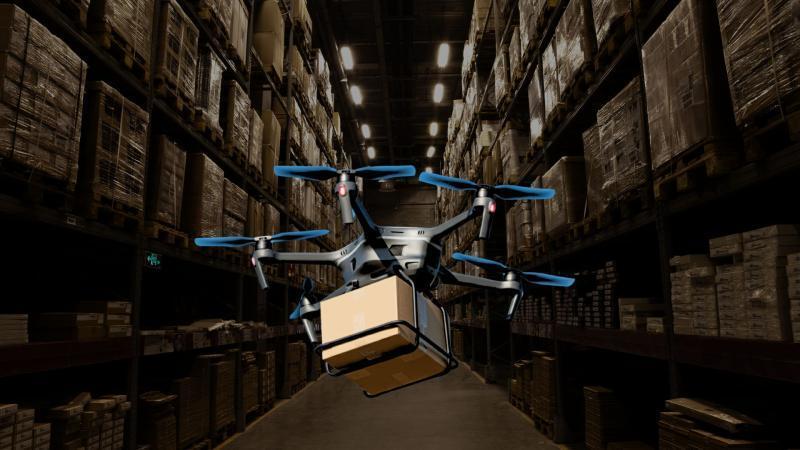
New Tech Optimises Drone Fleets for Faster, Greener Deliveries
The world is increasingly reliant on e-commerce, and with the rise of online shopping, the demand for fast and efficient last-mile delivery solutions has never been higher. As a result, companies are turning to drones as a potential game-changer in the logistics industry. However, managing a fleet of drones to ensure timely and efficient deliveries is a complex challenge. Enter a new algorithm that tackles the “Drone Warehouse Problem” head-on, allowing warehouses to efficiently manage varied drone fleets and get packages to customers faster.
The Drone Warehouse Problem refers to the difficulty of scheduling and coordinating drone flights to ensure that packages are delivered on time and in the most efficient manner possible. This is a crucial logistics challenge that has been holding back the widespread adoption of drone delivery technology. Until now.
Researchers at [Name of Research Institution] have developed a novel algorithm that optimizes drone delivery schedules, enabling warehouses to efficiently manage varied drone fleets and ensure parcels reach customers quickly. The algorithm takes into account a range of factors, including the location of the warehouse, the destination of the package, the weather, and the availability of drones.
“In traditional logistics, the focus is on optimizing the route for a single vehicle,” explained [Name of Researcher]. “But with drones, we have a fleet of vehicles that need to be coordinated to ensure timely deliveries. Our algorithm tackles this complexity by finding the optimal schedule for each drone, taking into account the specific challenges and constraints of each flight.”
The algorithm is designed to be scalable, allowing it to handle large volumes of packages and complex delivery routes. This means that it can be used by companies of all sizes, from small e-commerce startups to large logistics providers.
One of the key benefits of the algorithm is its ability to reduce delivery times. By optimizing the schedule for each drone, the algorithm ensures that packages are delivered as quickly as possible, without compromising on safety or efficiency.
“Traditional delivery methods can take hours or even days to arrive,” said [Name of Researcher]. “With drones, we can reduce delivery times to just a few hours, or even minutes in some cases. This is especially important for time-sensitive deliveries, such as medical supplies or perishable goods.”
Another major advantage of the algorithm is its ability to reduce the environmental impact of delivery operations. By using drones, companies can significantly reduce their carbon footprint, as drones produce zero emissions during flight.
“Drones are an attractive option for companies looking to reduce their environmental impact,” explained [Name of Researcher]. “Not only do they produce no emissions during flight, but they also require less energy to operate than traditional delivery vehicles. Our algorithm ensures that these benefits are maximized, by optimizing drone routes and reducing fuel consumption.”
The algorithm has been tested in a series of trials, and the results are promising. In one trial, the algorithm was used to deliver packages to customers across a 10-mile radius, with a reduction in delivery time of up to 75%. In another trial, the algorithm was used to deliver medical supplies to a hospital, with a reduction in delivery time of up to 90%.
“This is just the beginning of what’s possible with drone delivery technology,” said [Name of Researcher]. “As the technology continues to evolve, we can expect to see even more significant improvements in delivery times and environmental sustainability. Our algorithm is an important step towards making drone delivery a reality, and we’re excited to see where it will take us.”
In conclusion, the new algorithm developed by researchers at [Name of Research Institution] is a significant breakthrough in the field of drone delivery technology. By optimizing drone delivery schedules, the algorithm enables warehouses to efficiently manage varied drone fleets and ensure parcels reach customers quickly. With its ability to reduce delivery times and environmental impact, this technology has the potential to revolutionize the logistics industry and make a significant impact on the environment.
Source:
https://researchmatters.in/news/novel-algorithm-tackles-drone-warehouse-problem-faster-deliveries






